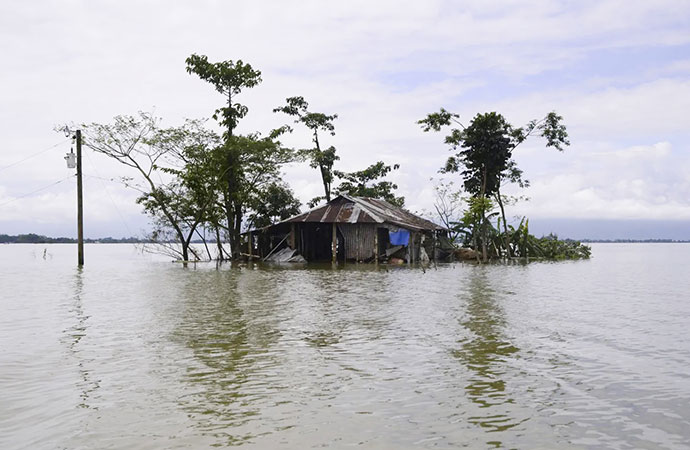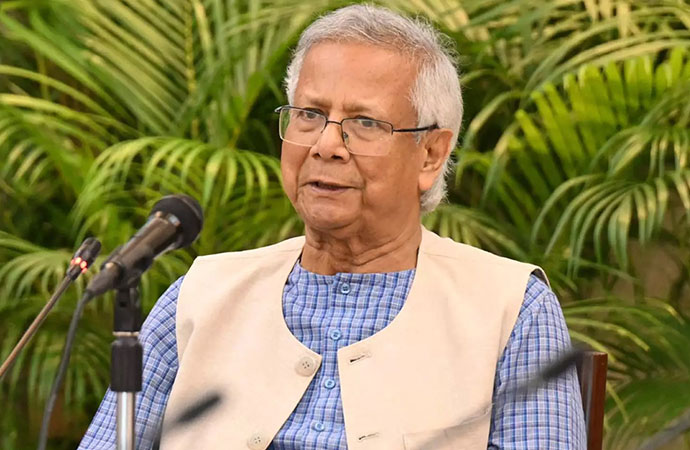Column

A house is surrounded by flood waters in Sylhet, Bangladesh. Photo: AP/UNB
South Asia will be one of the worst affected regions in the climate crisis. Melting Himalayan glaciers in Nepal, Bhutan, Pakistan and India will contribute to rising sea levels and increased flooding in downstream and coastal countries, including in Bangladesh, Sri Lanka and the Maldives. The industrial regulation of transboundary rivers can result in water scarcity and desertification. While the primary focus of climate justice has been on the obligations of industrialized states to reduce greenhouse gas emissions, South Asian states need to address the challenges to the environment emanating within the neighborhood.
In its recent Advisory Opinion on climate change, the International Court of Justice (ICJ) affirmed the human right to a "clean, healthy and sustainable environment" as a prerequisite for foundational rights to life, health, food, water and housing. Environmental protection is now recognized as a human right in 100 constitutions across the globe and in numerous treaties and UN resolutions. The ICJ also recognized the obligation of states "pertaining to the protection of the climate system" of the need to "prevent significant transboundary harm under customary international law". Crucially, the ICJ also addressed the potential territorial loss due to climate change and underscored that a sovereign state will continue to exist despite territorial loss.
The advisory opinion has been described as the most comprehensive and authoritative analysis of climate change from the perspective of international law. The ICJ declared that failure to honor climate obligations will constitute "an internationally wrongful act". The ICJ also reaffirmed the binding nature of the Paris Agreement's obligations for developed countries to provide climate finance, technology transfer and development aid for the most vulnerable countries. The court recognized climate change as an existential threat to humanity.
The principles of environmental protection emanating from the ICJ opinion can influence the deliberations of environmental disputes in South Asia. The ICJ rejected the narrow interpretation of industrialized states which argued that climate treaties were a lex specialis regime distinct from the general body of international law. Instead, the ICJ recognized the Paris Agreement, the UNFCCC, the Kyoto Protocol and other climate treaties as part of the general body of international law which would be reinforced by the principles of international law.
The Paris Agreement includes a mechanism to document the environmental conditions of a state which affect the climate transition. The "implementation and compliance" mechanism under Article 15 of the Paris Agreement includes a committee manned by 12 experts. A state can file a request to the committee to examine the implementation of the Paris Agreement within the boundaries of that state. The Paris Agreement pushes for the reduction of greenhouse gas emissions by promoting a climate transition to renewable energy.
The suspension of the Indus Waters Treaty between India and Pakistan can affect the climate transition in Pakistan which depends on the Indus River's flow for generating hydroelectricity. Pakistan can file a complaint before the committee arguing that India's dams on the Indus River are obstructing Pakistan's climate transition by withholding water needed for hydropower.
A more serious dispute can arise between Bangladesh and India if dams and barrages on the Indian side of the border cause catastrophic environmental damage in Bangladesh. The Farakka Barrage contributed to desertification in northern Bangladesh; while flooding in eastern Bangladesh caused by the opening of floodgates in Northeastern India constitute a breach of customary international law. The advisory opinion from the ICJ reinforces the principle of preventing transboundary environmental damage under international law.
Climate change is expected to cause territorial loss in Bangladesh. By some estimates, Bangladesh will lose between 11% to 30% of its coastal territory due to sea level rise. Some have speculated that the coastline will retreat further inland, with much of present-day coastal Bangladesh being submerged. The Maldives is one of the small island states which is anticipating total territorial loss due to rising sea levels. In the event of a state losing its entire landmass and its entire population being displaced, the ICJ ruled that such a state will not lose its sovereign status and will be presumed to function with legal continuity.
What are the practical implications of territorial loss? Should vulnerable states begin planning to relocate populations from areas which are likely to be submerged? Where would vulnerable and displaced populations be relocated? How will the relocations be financed? Will there be climate reparations from developed countries to support relocations for displaced communities? Can "climate refugees" acquire land in the vast uninhabited parts of Siberia, Canada or Australia? Should India, Pakistan and countries in Africa provide space for relocating "climate refugees"?
Territorial loss poses a challenge for maritime sovereignty. The ICJ reaffirmed the law of the sea concerning baselines. It upheld the UNCLOS provisions on established coastal baselines which are used to measure the maritime boundary and territory of a state. A state may seek to exploit underwater resources despite territorial loss.
South Asia will bear the brunt of the devastating impact of climate change. The advisory opinion from the ICJ heralds the emergence of a serious discourse on climate justice.
Umran Chowdhury is Assistant Editor of the Dhaka Courier and a Research Associate at the Cosmos Foundation and Bay of Bengal Institute.

























Leave a Comment
Recent Posts
HAISON Celebrates 10 Years of ...
HAISON International Ltd, founded by M Jalalul Hai, has made its mark ...
How to own an Uprising
One of the few constants of these last 13-and-a-half months has been t ...
The climate crisis in South Asia: The future of stat ..
February polls to be peaceful, festive despite attem ..
The blend of impulsiveness and understated abstracti ..
Five ways the state failed during Gen Z protest